Objection (argument)

In argumentation, an objection is a reason arguing against a premise, argument, or conclusion. Definitions of objection vary in whether an objection is always an argument (or counterargument) or may include other moves such as questioning.[1]
An objection to an objection is sometimes known as a rebuttal.[2]
An objection can be issued against an argument retroactively from the point of reference of that argument. This form of objection – invented by the presocratic philosopher Parmenides – is commonly referred to as a retroactive refutation.[3]
See also
Look up refute in Wiktionary, the free dictionary.
References
- ^ Douglas Walton (2013). Methods of Argumentation. p. 59. ISBN 1107435196.
- ^ Arnaud Chevallier (2016). Strategic Thinking in Complex Problem Solving. p. 93. ISBN 0190463910.
- ^ Bollack, J. (1990). “La cosmologie parménidéenne de Parménide,” in R. Brague and J.-F. Courtine (eds.), Herméneutique et ontologie: Mélanges en hommage à Pierre Aubenque. Paris: Presses Universitaires de France. p. 17-53.
